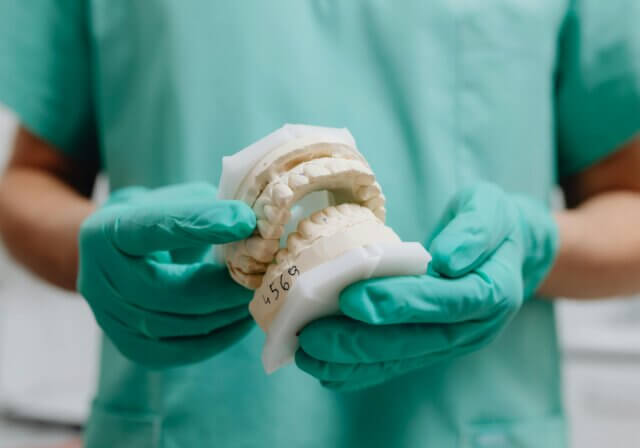Dental caries—commonly known as cavities—is a prevalent chronic disease that affects the hard structures of the teeth.
Research shows that a staggering 96 percent of Canadians have dealt with at least one cavity during adulthood. That means if you’re reading this, you’ve probably had a run-in with cavities at some point.
And since they’re so common, we ought to educate ourselves on their root causes, preventative practices, and treatment options.
Let’s start by defining cavities to better understand the diseases’ nature before exploring proven preventative techniques you can incorporate into your oral health regimen.
What Are Cavities?
Counter to the common misconception that cavities “eat holes in your teeth,” bacteria actually cause cavities by secreting acid onto teeth when we consume fermentable carbohydrates or sugar.
This “acid attack,” as we at Kelowna Dental Centre like to call it, weakens tooth enamel and, over time, will cause cavities. Whenever fermentable carbohydrates are introduced into the mouth, the bacteria are fed too.
And while our saliva does quite well in neutralizing bacterial acid, if there are more episodes of demineralization per day than remineralization, one’s enamel will eventually become too weak and lead to a “hole” in the tooth, which we call a cavity. Makes sense, right?
A small cavity may not cause pain or discomfort because the damage hasn’t yet reached the tooth’s inner layers. However, as the cavity grows and deepens, it can eventually reach the pulp: the soft, sensitive centre of the tooth that houses nerves and blood vessels. When this happens, the person may experience pain or sensitivity when eating or drinking hot or cold foods and drinks.
What Happens if Cavities Go Untreated?
If the cavity is left untreated, it will grow and spread, ultimately reaching the tooth’s root. At this stage, the damage to the tooth is significant, and a root canal may be necessary to save it.
A root canal is a dental procedure that removes the damaged or infected pulp from the tooth’s centre and replaces it with a filling material. The tooth is then sealed and protected with a crown, which helps to prevent further damage and restore its function.
We typically recommend root canals once the cavity reaches the tooth’s root, and the damage is too extensive for a simple filling to remedy. The procedure can save the tooth from extraction and prevent future dental problems.
How to Prevent Cavities
There are several essential measures to help prevent cavities, including:
- Reducing the frequency of sugar and other fermentable carbohydrates in your diet.
- Sugary drinks are particularly harmful, especially if you take a sip, walk away, and return to them over and over throughout the day. This repeated fermentable carbohydrate-tooth interaction is likely to cause complications and eventually cavities. Think sugary coffee or kids sipping juice between playing – this is an easy step in reducing your and your family’s risk of developing cavities.
- Sugary drinks are particularly harmful, especially if you take a sip, walk away, and return to them over and over throughout the day. This repeated fermentable carbohydrate-tooth interaction is likely to cause complications and eventually cavities. Think sugary coffee or kids sipping juice between playing – this is an easy step in reducing your and your family’s risk of developing cavities.
- Brushing twice per day and flossing (at least) once per day.
- Plaque is the gooey layer that forms on your teeth by the end of the day, which we want to disrupt and brush or floss off. The cavity-causing bacteria in our mouths live as a “plaque biofilm,” where substances from the oral environment insulate and protect the bacterial colony. Without regular disruption of this plaque layer, bacteria thrive in the mouth, making cavities more likely.
- Plaque is the gooey layer that forms on your teeth by the end of the day, which we want to disrupt and brush or floss off. The cavity-causing bacteria in our mouths live as a “plaque biofilm,” where substances from the oral environment insulate and protect the bacterial colony. Without regular disruption of this plaque layer, bacteria thrive in the mouth, making cavities more likely.
- Use products containing xylitol.
- Xylitol is a naturally occurring sugar alcohol known to be effective in reducing the growth of cariogenic (cavity-causing) bacteria in the mouth. By reducing the amount of bacteria in the mouth, xylitol helps prevent cavities from forming. Xylitol is also a low glycemic index sweetener, meaning it doesn’t cause spikes in blood sugar levels, which can increase the risk of cavities. You can find xylitol in various forms, like chewing gums, mints, and toothpaste.
- Xylitol is a naturally occurring sugar alcohol known to be effective in reducing the growth of cariogenic (cavity-causing) bacteria in the mouth. By reducing the amount of bacteria in the mouth, xylitol helps prevent cavities from forming. Xylitol is also a low glycemic index sweetener, meaning it doesn’t cause spikes in blood sugar levels, which can increase the risk of cavities. You can find xylitol in various forms, like chewing gums, mints, and toothpaste.
- Use topical fluoride products.
- Fluoride is a naturally occurring mineral that has been shown to help prevent cavities by strengthening the enamel (the hard outer layer of the teeth), making it more resistant to acid attacks by plaque bacteria. Fluoride is commonly found in dental professionals’ toothpaste, mouth rinses, and fluoride treatments. Fluoride products are proven to significantly reduce the incidence of cavities in individuals of all ages.
- Fluoride is a naturally occurring mineral that has been shown to help prevent cavities by strengthening the enamel (the hard outer layer of the teeth), making it more resistant to acid attacks by plaque bacteria. Fluoride is commonly found in dental professionals’ toothpaste, mouth rinses, and fluoride treatments. Fluoride products are proven to significantly reduce the incidence of cavities in individuals of all ages.
- Salivary flow is also an underestimated factor in cavity formation.
- Patients who lack adequate salivary flow from smoking, medications, cancer, saliva blockages, etc., will develop cavities more quickly than others with sufficient saliva. If you feel you have a dry mouth, connect with your dental hygienist or dentist to see what they suggest.
- Patients who lack adequate salivary flow from smoking, medications, cancer, saliva blockages, etc., will develop cavities more quickly than others with sufficient saliva. If you feel you have a dry mouth, connect with your dental hygienist or dentist to see what they suggest.
- Visit your dentist and dental hygienist regularly for dental cleanings and checkups.
- 90% of dental disease is asymptomatic. Your dental professionals at Kelowna Dental Centre can help identify signs of dental decay as early as detectable to ensure your optimal oral health
Cavities: The More You Know
Thanks for reading today’s blog post – we hope you learned something new and feel more equipped with practical tools to stop cavities in their tracks.
If you’re dealing with cavities and need professional dental care, look no further than Kelowna Dental Centre. Our doctors, certified dental assistants, and dental hygienists improve our patients’ lives through education, exceptional treatment, and personalized oral health assessments.
Click here to book your next dental appointment – we can’t wait to care for you!
Dr. Jennifer Drever
General Dentist
Kelowna Cavity Dentist
Cavity Treatment Kelowna
Kelowna Dental Centre



